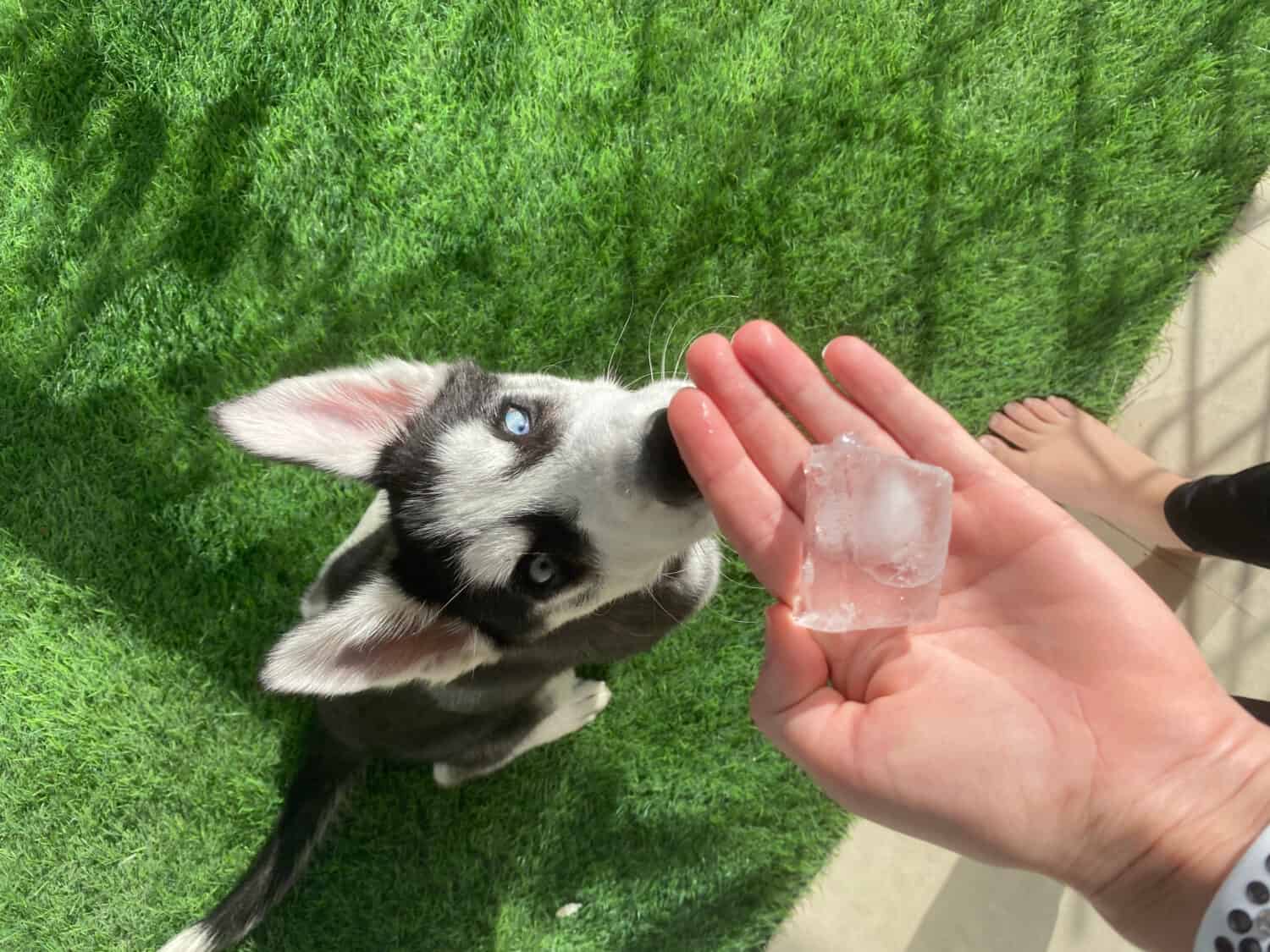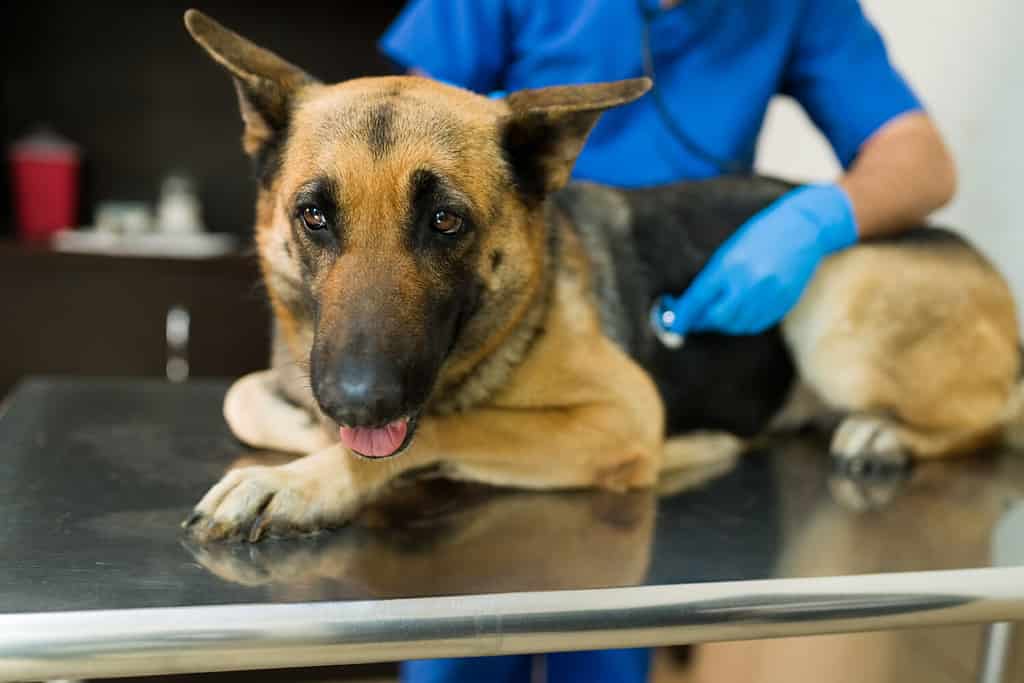Treating dog diarrhea can be as tough as nailing jelly to a tree for pet owners. With the right moves, you can make your four-legged buddy feel better. This informative post will explore ten different ways to treat dog diarrhea, from changing their diet to using fancy meds. Armed with these nifty tricks, your dog will enjoy optimum health in no time.
Treating Dog Diarrhea Made Easy: 10 Effective Methods
1. Fasting
By withholding food for 12 to 24 hours, the body can focus on cleansing itself instead of processing new food. Be sure to provide plenty of fresh drinking water throughout this period to keep your pup hydrated.
2. Adopt a Bland Diet
Once your pet is over their short fast, it’s time to introduce a more gentle type of sustenance. Low-fat, easily-digestible meals like boiled chicken & rice or homemade meatball soup are ideal during this phase. Feeding smaller, frequent meals (instead of one large daily feeding) encourages quicker recovery.
3. Introduce Probiotic-Rich Food
These friendly bacteria are crucial in maintaining a balanced gut ecosystem. If your pet needs extra support, try adding probiotic-rich foods such as Greek yogurt or sauerkraut into their diet. Additionally, look for high-quality commercial probiotics specifically designed for dogs at your local pet store or through online retailers.

Incorporate Greek yogurt or sauerkraut into their diet and find specialized dog probiotics at local pet stores or online.
©Prostock-studio/Shutterstock.com
4. Keep Them Well-Hydrated
Diarrhea can wreak havoc on your pup’s body and dry them out fast. Ensure they’ve access to clean drinking water. Additionally, consider offering Electrolyte Solutions or Pedialyte to replace essential liquids and minerals.
5. Boost Pumpkin Intake
This mighty gourd packs a ton of benefits into one neat package. Rich in fiber and loaded with vitamins and antioxidants, pumpkins help strengthen loose stools and support the immune system.
6. Introduce Bone Broth
With natural hydration, collagen, gelatin, and antioxidants, homemade or store-bought bone broth is like a soothing hug for the GI tract.
7. Serve Portions of Chicken and Rice
This comfort food duo delivers easily digestible protein plus carbs without zero tricky additives. Cook chicken breast meat (skinless), mix it with plain rice, and serve your dog in small portions throughout the day.
8. Give Your Dog Baby Food
When pups experience gastrointestinal upsets, they need digestible meals that won’t irritate their intestines. Baby food is a good idea due to its simple composition. Exclude varieties containing potentially harmful ingredients such as garlic, onions, sugar, sodium, and seasonings from your selection.
9. Use Ice Cubes
One way of treating dog diarrhea is using ice cubes. They will cool down their stomach and reduce nausea and vomiting. The melting ice also provides essential hydration while preventing overdrinking, which could worsen the condition.

The cooling effect soothes the stomach and alleviates nausea and vomiting.
©Ashlee-Louise Steward/Shutterstock.com
10. Seek Professional Assistance
Sometimes, there’s just no escaping professional intervention. Your veterinarian can assess the root causes behind your dog’s loose bowels and write out specialized treatment plans accordingly. Following the advice of medical professionals guarantees swift relief.
What Causes Dog Diarrhea?
1. Eating Something Spoiled or Toxic
If your dog develops diarrhea, there’s a good chance it’s due to him consuming something that didn’t agree with his sensitive gut. Troublemakers often include nasty items it shouldn’t eat in the first place, such as:
- Spoiled food
- Dangerous snacks (like chocolate)
- Other indigestible items
Ingesting these substances aggravates its insides, leading to squishy, bloody bowel movements and discomfort.
2. Food Allergies or Intolerance
Another potential reason is food allergies or intolerances. Certain ingredients in commercial dog food can spark an allergic reaction in some canines, leading to irritation and damage within their digestive systems. These ingredients include:
- Chicken
- Beef
- Dairy
- Wheat
- Soy
- Corn
Symptoms include:
- Loose bowel movements
- Itching
- Hives
- Infections around the ears
- Unexplained weight loss
If your dog experiences these signs, seeking professional advice from a vet is essential. Diagnosing this type of diarrhea requires more than just prescribing medications. Instead, your vet will recommend a food elimination trial. Change your pup’s menu and offer a specialized, easily digested formula free of common allergens. If the issue subsides, slowly reintroduce individual elements into their diets to identify which substances caused the upset stomach.

Some ingredients in commercial dog food can trigger allergies in certain dogs, causing irritation and damage to their digestive systems.
©Prystai/Shutterstock.com
3. Parasites, Such as Worms or Giardia
Whether through worms or dangerous pathogens such as giardia, parasites can attach themselves to your dog’s guts, affecting the digestive process. An invasion by these microorganisms leads to watery, blood-filled, or slimy poop accompanied by noticeable changes in your pet’s overall health, including:
- Weight loss
- Dullness in their fur
- Low energy levels
- Visible weakness due to dehydration
To treat and prevent Giardiasis in canines:
- Administer proper parasite control using conveniently available OTC or prescribed dewormers suitable for the particular type of parasite troubling your dog.
- Get their fecal matter tested annually or more frequently if circumstances demand it, especially after meals or in large amounts.
- Dispose of their waste appropriately and maintain cleanliness.
- Prevent them from indulging in potentially dirty waters or consuming treats left by fellow creatures.
- Schedule routine dewormings tailored to its unique needs.
4. Bacterial or Viral Infections
Infection is one of the top reasons for dog diarrhea. Germs like bacteria and viruses lead to loose stools, sometimes with blood or mucus. It could result from eating tainted food or touching other infected animals. Your dog might experience these symptoms if they have such an infection:
- Frequent liquid poop
- Vomiting
- Fever
- Dehydration
- Loss of appetite
Your veterinarian may prescribe antibiotics or antivirals to fight off the disease and stop serious problems.

Infection can result from consuming contaminated food or coming into contact with infected animals
©Take Photo/Shutterstock.com
5. Stress or Anxiety
Did you know that stress and anxiety can have significant health consequences on our furry friends? Stress can lead to digestive issues like diarrhea in dogs. This condition, commonly called “stress colitis,” occurs when stress causes inflammation in the colon or weakens the immune system. And it’s not just temporary; this chronic issue can persist for weeks, months, or even years if left untreated. So how do we prevent our dogs from falling victim to stress diarrhea? Well, there are several potential triggers of stress in dogs that we need to watch out for. These could range from:
- Changes in their daily routine
- Separation from loved ones
- Exposure to loud sounds
- Traveling
- Conflict with other animals or humans
- Any other environmental factors that can trigger feelings of unease
Of course, symptoms vary from dog to dog, so careful observation is critical here. Some signs of stress and anxiety in dogs include:
- Diarrhea
- Vomiting
- Loss of appetite
- Excessive panting
- Destructive behavior
- Hiding
- Trembling
- Increased energy levels
- Barking or whining more than usual
- Decreased urine output
- Lethargy
- Restlessness
- Shaking, twitching, or tremors
- Sensitivity to touch
- Unusual attachment or clinginess with owners
To ensure your pet feels calm and collected, take action by identifying and removing sources of stress whenever possible. Provide a comfortable place to retreat and engage in activities it enjoys. Shower it with affection and attention and practice positive reinforcement training. Ensure adequate exercise opportunities and regularly reward good behavior. Make mealtimes enjoyable, and seek professional assistance if required. You can help a dog live its best life with love and care!
6. Inflammatory Bowel Disease (IBD)
Inflammatory Bowel Disease (IBD) is a complex condition involving long-term irritation and injury to the digestive system. Unfortunately, canines of varying ages, breeds, and genders aren’t immune to its impact. However, some four-legged dogs are more prone to it — German Shepherds, Weimaraners, and Rottweilers. Scientists haven’t yet pinpointed what leads to this illness, though genetic elements, compromised immune systems, nutritional intolerances, and external influences might contribute. If your dog falls prey to IBD, noticeable indicators will surface:
- Diarrhea
- Persistent throwing up
- Lackluster coat appearance
- Gas buildup
- Decreased interest in eating
- Weight loss
- Anemia
IBD in dogs can only be definitively confirmed by examining affected tissues via biopsy. This procedure helps veterinarians identify the level and type of inflammation present while ruling out alternative intestinal issues. Further testing, including but not limited to:
- Blood tests
- Fecal tests
- X-rays
- Ultrasound
- Ingestible cameras
When addressing IBD in four-legged family members, clinicians aim to mitigate the underlying inflammation causing distress and prevent potential consequences. Treatment could entail medications, nutrition/diet adjustments, vitamin/mineral supplements, pain relievers, and more based on the unique case and how well your pup responds. Surgical intervention might become necessary if severe enough damage has occurred inside their gastrointestinal tract.

IBD in dogs requires a definitive diagnosis through biopsy, which examines affected tissues.
©Yobab/Shutterstock.com
7. Pancreatitis
Dogs with pancreatitis suffer from acute or chronic bouts of this gastrointestinal issue because their pancreas becomes inflamed. The pancreas is essential for producing digestive enzymes and managing your pet’s blood sugar levels. While veterinarians don’t always know how or why it arises, it could result from scavenging behaviors such as snacking on trash or ingesting high levels of fatty meals. Certain conditions like diabetes, obesity, and select medications might increase the likelihood. Don’t overlook these symptoms either:
- Severe tiredness
- Stomach aches
- Persistent nausea
- Watery bowel movements
- Weight loss
- Fever
Diagnosing pancreatitis involves assessing symptoms during a physical examination and conducting laboratory tests like X-rays, ultrasounds, and blood tests to check specific enzyme/hormone levels released by the pancreas. Veterinarians consider factors like age, breed, nutrition, underlying health issues, drug therapy, recent abdominal procedures, etc., to determine if your furry friend has pancreatitis.
Canine pancreatitis treatment varies depending on severity. For mild cases, outpatient care might be sufficient. However, severe instances could lead to hospitalization for fluid replacement, antibiotics therapy, and diet modification. Sometimes, surgical intervention may be necessary to remove affected tissue, abscesses, or blockages.
8. Liver Problem
Treating dog diarrhea can occasionally necessitate evaluating the state of the liver. The liver performs several critical tasks, such as removing toxins from the body and helping with digestion. If the liver isn’t working correctly, it can lead to diarrhea, among other issues. There are three primary ways that liver troubles can trigger diarrhea in dogs:
- Reduction of bile acid production: If there isn’t adequate bile, fats won’t get broken down effectively, causing greasy, smelly stools with distinct colors (yellow/gray).
- Toxic buildup in the blood: If the liver becomes impaired, harmful elements might increase within the bloodstream. The condition may contribute to mental issues, such as seizures, personality changes, or depression, in addition to GI issues, like diarrhea.
- Secondary contaminants or swelling: The liver plays a key part in the immune response and inflammation management. A weakened liver could make pups extra inclined to microbial or gastrointestinal-related inflammation concerns, resulting in diarrhea plus other complications like fever, throwing up, or belly discomfort.
Liver problems in dogs can occur due to various reasons, such as:
- Congenital or acquired shunts
- Infections
- Toxins
- Cancer of the liver
- Immune-mediated diseases
- Trauma or injury to the liver
Watch out for these warning signals if your pet seems unwell:
- Jaundice
- Decline in hunger
- Weight loss
- Vomiting
- Diarrhea
- Bloating
- Excessive drinking/urinating
- Changes in fecal texture
- Neurological troubles
When you sense any symptoms of liver trouble in your furry friend, rush them off to the vet without further ado. They will run multiple assessments, including blood tests, urine analyses, image scans, or biopsies, to pinpoint the culprit behind their woes. Your doctor will provide appropriate meds, alter their diet to fit the liver’s requirements, and recommend supplements to aid recovery.

A compromised liver can increase the susceptibility of dogs to microbial or gastrointestinal inflammation, leading to symptoms such as diarrhea, fever, vomiting, and abdominal discomfort.
©Catalina Arango/Shutterstock.com
9. Kidney Problem
Kidneys perform essential tasks like removing wastes, adjusting liquids, managing blood pressure, and generating red cells. Kidney issues in dogs can lead to diarrhea through several mechanisms, including:
- Reduced water absorption
- Increased toxic buildup in the blood
- Secondary infections or inflammation
These factors can ultimately result in the following:
- Dehydration
- Diarrhea
- Nausea
- Vomiting
- Ulcers
- Bleeding
- General discomfort
It’s essential to consult with a veterinarian if you suspect any kidney issues or accompanying symptoms in your pet.
10. Cancer
Due to its complex nature, cancer can develop virtually anywhere within our dog’s bodies. Sometimes, this insidious illness targets their digestive systems, leading to life-altering consequences. But how does cancer wreak havoc on our pet’s precious GI tract?
The intestines comprise a crucial yet delicate network of organs responsible for processing nutrients and waste matter. The small intestine and large intestine work together seamlessly under healthy conditions. But cancer upsets this synchronized dance by causing these vital processes to malfunction. As a result, this leaves your dog feeling less than optimal due to pesky loose bowel movements.

Cancer can affect various parts of a dog’s body, including their digestive system, causing significant and life-changing impacts due to its complex nature.
©marialevkina/Shutterstock.com
How Does Cancer Affect a Dog’s Gut Functionality?
First, malignant cells breach the protective barrier of the intestinal wall, hindering its ability to absorb critical fluids and nutrients. As a result, defiance in the form of watery stool plagues unsuspecting dogs.
Next, cancerous agents release toxic compounds that meddle with the natural rhythmic contractions of the intestine. This results in unpredictable, distressing poop patterns.
Malevolent cancer cells induce uncontrolled inflammation and rupture within the sensitive gut lining, prompting acute pain, nausea, bowel irregularities, and diarrhea.
Finally, the continuous growth of rogue tumors obstructs the otherwise orderly progression of food and excrement. Abdominal cramps ensue alongside varying episodes of constipation, vomiting, and diarrhea.
How Cancer Affects Other Organs
Cancer’s destructive march across bodily terrain leaves no stone unturned. These vital organs serving various purposes become collateral damage in the war between life and malignancy. For example, cancer cells may spread to vital organs like the liver, kidneys, and pancreas, causing metastasis which could result in organ failure.
They may also trigger histamine release leading to allergy symptoms and stomach issues like ulcers, vomiting, and diarrhea. In addition, they might press on or penetrate organs, resulting in pain, swelling, yellowed skin, fluid build-up, etc. Understanding how cancer impacts these essential organs can aid treatment options and management decisions for improved quality of life.
How to Diagnose and Treat Cancer in Dogs
Immediate veterinary attention is crucial if the canine has persistent diarrhea and other health complications like weakness, poor appetite, or trouble breathing. The veterinarian performs a thorough examination & runs various tests:
- Blood tests: Evaluates anemia, inflammation, organ function, electrolytes, and tumor markers.
- Urinalysis: Looks out for infections, kidney problems, dehydration, & blood in pee.
- Fecal analysis: Checks for gastrointestinal issues due to bacterial, viral, or parasitic infestations or unabsorbed nutrients in feces.
- Abdominal imaging through X-rays/ultrasound scanning: Detects any tumors or blockages.
- Endoscopy or biopsy procedures: Visualizes and retrieves intestinal or organ tissues for detailed inspection & assessment.
Timely intervention ensures appropriate diagnosis & necessary care for pet health. Please schedule the visit after confirming the appointment hours at your nearest animal hospital to provide proper care for your furry friend!

Immediate veterinary care is vital for dogs experiencing persistent diarrhea and accompanying symptoms such as weakness, reduced appetite, or breathing difficulties.
©Beach Creatives/Shutterstock.com
Final Considerations for Treating Dog Diarrhea
Dog diarrhea can arise for several reasons, such as poor diet or medical issues. Luckily, there are ways you can address this unpleasant situation and help your furry friend feel better swiftly! Treating dog diarrhea doesn’t have to be a daunting challenge. From fasting and administering a bland diet to boosting probiotic levels and consulting veterinary care if required, we’ve explored 10 top approaches for promptly relieving your pup’s digestive distress. With knowledge of causative factors and these helpful cures, your companion will soon resume normalcy as they happily wag that tail!
The photo featured at the top of this post is © Olya Maximenko/Shutterstock.com
Ready to discover the top 10 cutest dog breeds in the entire world?
How about the fastest dogs, the largest dogs and those that are -- quite frankly -- just the kindest dogs on the planet? Each day, AZ Animals sends out lists just like this to our thousands of email subscribers. And the best part? It's FREE. Join today by entering your email below.
Thank you for reading! Have some feedback for us? Contact the AZ Animals editorial team.







